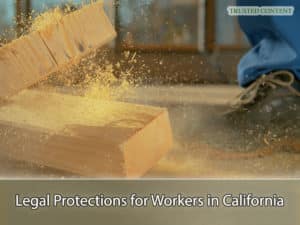The issue of understaffing has become increasingly prevalent across various industries in California, posing significant risks not only to the safety and health of employees but also impacting the operational success of businesses. The correlation between understaffed workplaces and the increased incidence of workplace accidents is well-documented, underscoring the need for stringent safety protocols and adequate staffing levels. California law provides a framework designed to protect workers from the hazards associated with understaffing, emphasizing the importance of employer compliance with these regulations. This article explores the multifaceted risks associated with understaffing, the legal protections available to workers in California, and the steps that can be taken to mitigate these risks.

The Consequences of Compromised Safety Training
The Consequences of Compromised Safety Training
One of the most direct impacts of understaffing is the significant reduction in the quality and frequency of safety training provided to employees. In environments where the workforce is stretched thin, the allocation of time and resources to comprehensive training programs is often seen as a lower priority. This oversight can lead to a workforce that is ill-equipped to handle the specific safety challenges of their roles, increasing the likelihood of accidents and injuries. California's Occupational Safety and Health Administration (Cal/OSHA) mandates that all employees receive proper safety training relevant to their job functions, highlighting the legal requirement for employers to invest in their workers' safety education. Failure to comply with these regulations not only endangers employees but also exposes employers to legal and financial repercussions.
Increased Workload and Safety Oversights
Understaffing invariably leads to an increased workload for existing employees, who may find themselves performing tasks at a pace or in a manner that compromises safety. The pressure to maintain productivity levels with fewer staff members can result in shortcuts, neglected safety measures, and an overall increase in workplace stress. Such conditions are conducive to accidents, particularly in industries where physical labor and interaction with machinery are prevalent. The California Labor Code provides clear guidelines on the maximum allowable work hours and mandated rest periods, aiming to prevent worker fatigue and its associated risks. Employers who fail to adhere to these guidelines risk not only the well-being of their employees but also significant legal penalties.
Delivery Sector Strain
The delivery sector, characterized by tight schedules and high delivery quotas, is particularly vulnerable to the effects of understaffing. Drivers rushing to meet deadlines may engage in unsafe driving practices, while those loading and unloading goods may do so in a hurried and hazardous manner. The resultant increase in the risk of both on-the-road accidents and injuries during cargo handling underscores the need for adequate staffing levels. California vehicle and labor laws set forth specific safety standards and rest requirements for drivers, aiming to mitigate these risks. Compliance with these laws is crucial for protecting not only the safety of delivery personnel but also the public.
Manufacturing Hazards Amplified
In the manufacturing sector, the precision and attention to detail required can be severely compromised by understaffing. The push to meet production targets with insufficient personnel often leads to a disregard for safety protocols, increasing the risk of accidents involving machinery and equipment. The California Code of Regulations mandates that manufacturing facilities adhere to strict safety standards, including the provision of protective equipment and the implementation of comprehensive safety protocols. Employers in the manufacturing industry must recognize the critical importance of these regulations in preventing workplace injuries and ensuring a safe working environment.

Legal Protections for Workers in California
Legal Protections for Workers in California
California provides robust legal protections for workers, particularly in the context of workers' compensation and workplace safety. The state's workers' compensation system ensures that employees injured on the job receive medical treatment, wage replacement, and other benefits, regardless of fault. Additionally, California's Division of Workers' Compensation (DWC) and Cal/OSHA play pivotal roles in enforcing safety regulations and assisting injured workers. Employers are required by law to maintain a safe work environment and may face significant penalties for failing to do so. Workers who believe their injuries are a result of understaffing and compromised safety measures have the right to seek legal recourse and are encouraged to consult with a knowledgeable attorney to understand their rights and options.
Strategies for Prevention and Legal Recourse
To mitigate the risks associated with understaffing, employers must prioritize the implementation of comprehensive safety programs, ensure adequate staffing levels, and adhere to all relevant labor laws and safety regulations. Investing in employee training, enforcing rest breaks, and fostering a culture of safety can significantly reduce the incidence of workplace accidents. For workers injured due to understaffing-related negligence, pursuing legal action can not only provide compensation for their injuries but also encourage employers to adopt safer practices. Legal professionals specializing in workers' compensation and workplace safety laws can offer invaluable assistance in navigating the complexities of the legal system and advocating for the rights of injured workers.
The Impact of Understaffing on Workplace Safety in California
The Impact of Understaffing on Workplace Safety in California
The impact of understaffing on workplace safety is a pressing concern that requires immediate attention from both employers and employees. By understanding the risks and legal protections associated with understaffing, workers can better advocate for their safety and well-being. Employers, for their part, must recognize their legal obligations to maintain safe staffing levels and implement effective safety training programs. For those affected by workplace injuries in California, seeking legal assistance is a critical step toward securing the compensation and justice they deserve. Napolin Accident Injury Lawyer is committed to supporting injury victims through comprehensive legal representation. Injured workers are encouraged to call us at (866)-NAPOLIN for a free consultation, ensuring they receive the expert guidance and support necessary to navigate their legal options.
- Understanding Uber Accidents and Insurance Coverage Periods in California - April 8, 2025
- A Guide on Red Light Auto Accidents in California - August 14, 2024
- Self-Representing in a California Personal Injury Claim - August 13, 2024
